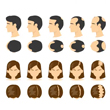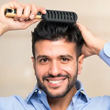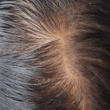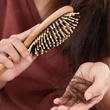Best Ways To Protect Your Hair From Sun Damage
Exposing your hair to sunlight can be beneficial, or it can cause damage to it. There are many positive aspects to sunning your hair. The Sun is a huge source of vitamin D. It brightens your hair, promotes new growth, gets rid of fungal infections, and prevents hair loss.

But then, you may ask, is sunlight good for hair? The answer is yes and no. Although your hair may benefit in the ways mentioned above, the ultraviolet (UV) rays of UVA and UVB of the Sun can damage your hair. These rays have a bleaching effect on the hair. (1)
Causes of Hair Damage
There are various causes of hair damage like harsh shampoos, unsuitable combs and brushes, and excessive exposure to heat, sunlight, and chlorine (from swimming pools).

Let's consider the different causes of hair damage:
Shampoos
It is surprising how much shampoos can harm your hair. The chemicals present in shampoos can have a damaging effect on your hair. Sulphates present in many shampoos have a detergent-like action, cleaning the hair of oil and dirt but damaging it in the process.
Lack of Moisture
If your hair is dry, it is more prone to damage. After shampooing your hair, use a conditioner once or twice a week. It will keep your hair nourished and can have a moisturising effect on it.
Incorrect Combing Techniques or Using the Wrong Comb
When you comb or brush your hair, do not be rough on your hair. Yanking on it to get rid of the knots will cause breakage to hair strands. Use a wide-toothed comb or a detangling brush. Detangle your hair before you wash it for the best results.
Rough Drying
Rubbing your hair vigorously after washing will damage it. Rub it gently, squeezing out the moisture with a towel rather like how you would dry a cashmere sweater.
Excessive Heat
The heat-generating styling tools like dryers, curlers, and flat irons can wreak havoc on your hair. Limit the use of such tools to once a week. (2)
Impact of Hair Damage by the Sun
When we discuss the issues related to the question, is sunlight good for hair, it is good to have an insight into the effects of the Sun. There is a photochemical reaction that takes place on exposing hair to excessive sunlight that causes irreparable damage.
The outer layer of the hair shaft is made of keratin fibre. It gets affected by mechanical, physical, and chemical action. Excessive exposure to the Sun creates a photochemical reaction that results in the breakdown of hair protein and loss of hair pigment.
This hair protein degradation occurs due to exposure to UV radiation within the wavelengths of 254 nm to 400 nm. This type of radiation has two components – UVA and UVB radiation. While UVA radiation causes colour changes, UVB radiation results in loss of hair protein.
The absorption of radiation results in the production of free radicals, which adversely affect hair proteins, particularly keratin. Melanin is present in hair products that contain UV filters. It partially immobilises free radicals. Therefore, using such hair products can protect your hair from the adverse effects of the Sun. (3)
General Hair Care Tips and How to Protect it from the Sun
Here are some ways that you can look after your hair, including protecting it from the Sun, especially during bright, hot summer days:(4)

Treat Thin Hair with Silicone
If your hair is thin and lifeless, using hair products that contain silicone will coat your hair strands to appear fuller and less greasy.
Don’t use Oil to Treat Dandruff
Dandruff isn’t dry skin. It is a minor skin disorder of the scalp. Rubbing oil into your scalp can make it worse. Use a medicated shampoo instead.
Use Lukewarm Water
Using hot water can eliminate protective oils from your hair, and it becomes dull. While you don't need to shower with cold water, you can use lukewarm water instead.
Use Protein-packed Conditioners
Conditioners containing protein will seep into the hair shafts, and repair split ends. But you need to do this regularly, as the fix isn’t permanent.
Avoid Blow-drying
The heat from a hairdryer can damage your hair and cause hair loss, especially if you have fine hair. Turn down the heat or avoid using such tools altogether.
Stay Out of the Sun
In response to the question “Is sunlight good for hair?” the answer is yes, in moderation. So if you expose yourself to enough Sun to damage your skin, it can do the same for your hair. Use a hat during summer and trim the ends of your hair frequently.
Shower Before Swimming
If you shower before swimming, you can minimise the adverse effects of pool chlorine. The chemicals of the pool will not penetrate as much if your hair is already wet.
Reduce Your Brushing Time.
The need to brush your hair 100 times a day is a myth. The more you brush, the more hair you lose. Avoid brushing your hair too frequently, and use a comb only on wet hair.
Tips for Frizzy Hair Care
Frizzy hair can look striking when carefully styled. However, it’s challenging to maintain. Special care needs to be done to keep the hair healthy and lustrous.

We offer a few useful tips for managing such hair.(5)
- Wash your hair every week or even every two weeks.
- Make sure to coat the ends when you use a conditioner.
- Use hot oil treatment once a month to maintain moisture and elasticity.
- Apply heat protecting products before styling with hot hair styling tools
- Use ceramic irons or combs while pressing your hair.
- Avoid hairstyles that pull your hair too tightly.
Conclusion
Is sunlight good for Hair? The answer here is in moderation, yes, but in excess, definitely not. If you want your hair to be healthy and strong, you have to establish a hair care routine that protects it from the Sun. Initially, this could be challenging at first, but with the information provided here, you can establish a routine that suits you best. (6)
Myth Busters HairFall

Androgenetic Alopecia - Everything You Need To Know
Have you been experiencing excessive hair fall over a prolonged period of time? It could be an early sign of androgenetic alopecia. It is a hair loss disorder common in both genders and can lead to progressive thinning and even baldness in some patients if not caught and treated early.

How To Make Hair Grow Faster For Men
A head full of healthy hair is a matter of confidence. Hair has its own mechanism of growing and shedding, and it is when this mechanism is thrown off that growth is hindered. Especially in the case of males, hair growth faces a lot of hiccups that can easily be managed.

Female Pattern Baldness - Causes & Treatments
Have you suddenly noticed an increase in the number of hair strands on your pillow in the morning? Or is your ponytail getting thinner by day? Well, you might be suffering from female pattern baldness. While that does sound scary, identifying it early on is key to treating this condition effectively. So keep reading to know what this is, how you can identify it, and most importantly, what treatments you can avail of to get your beautiful lustrous hair back.

What Are The Reasons For Hairfall?
Almost everyone experiences some amount of hair thinning over the years. Shedding around 50 to 100 single strands of hair per day is considered normal. However, losing more than 150 strands a day, experiencing sudden thinning, or developing circular bald patches on your scalp are reasons for concern. Hair loss occurs when new hair doesn’t grow fast enough to replace the amount of hair you lose daily. Hair can fall due to various reasons, with hereditary hair loss and poor nutrition being the most common hair fall reasons.

Expert Approved Tips For Hair Growth
What can be more debilitating than seeing hundreds of hair strands shedding from your scalp every time you brush your hair? Also, excessive molting occurs during seasonal changes that can be very stressful for you. Although it’s okay to lose between 50-100 strands every day, according to the American Academy of Dermatology, the problem occurs when you start shedding more than normal. But that doesn’t mean you have to feel helpless as there are ways to grow your hair back. Even if you are coping with baldness or alopecia, certain hair growth tips from dermatologists can come to your rescue. Read on to discover how these tips can be your savior when abnormal hair fall problems are in sight.
Trending Videos
+ 6 Sources
'LMRC - GGI-CO-A2-DMA-300001252-300001252-WM-L21-704'
© 2021 Dr. Reddy’s Laboratories Ltd. All rights reserved.